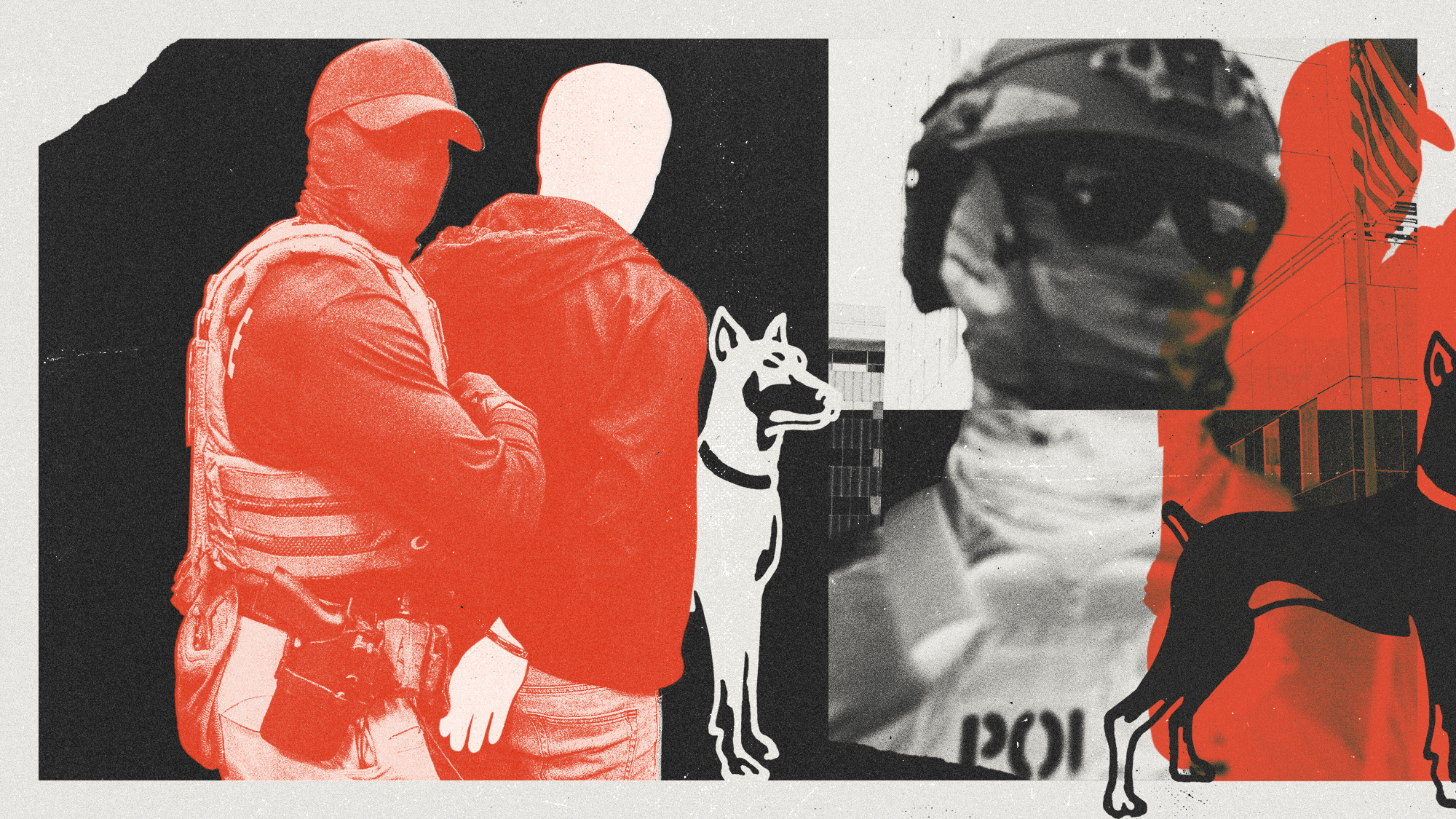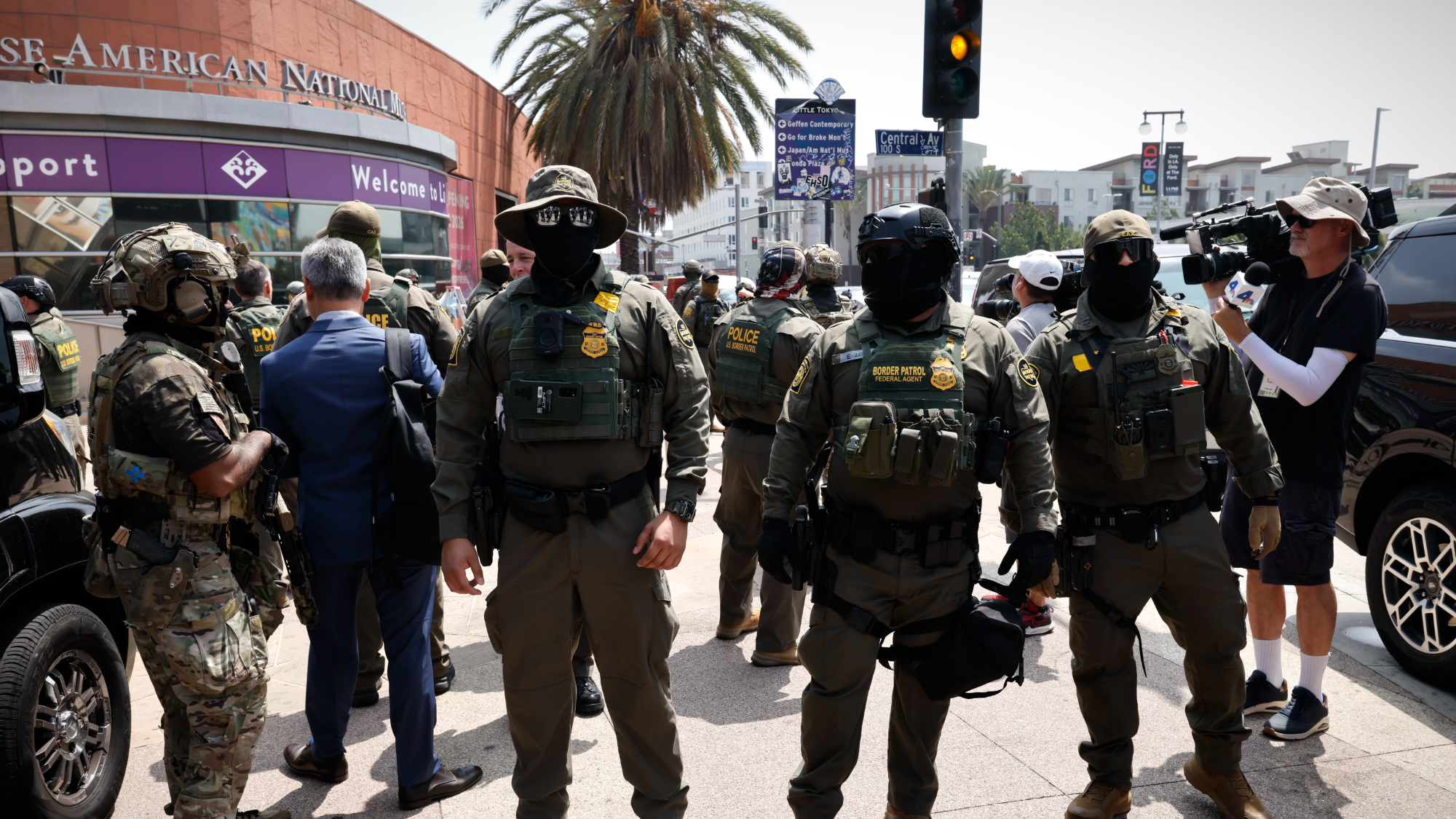Are masked ICE agents America's new secret police?
Critics say masks undermine trust in law enforcement


A free daily email with the biggest news stories of the day – and the best features from TheWeek.com
You are now subscribed
Your newsletter sign-up was successful
The face of the Trump administration's immigration crackdown is hidden. Masked ICE agents are swooping into American cities to detain and deport suspected migrants. Critics say those masks carry echoes of "secret police" in authoritarian countries.
Masked agents have become a "calling card" of the administration, said CNN. News and social media videos have captured the masked officers making arrests of suspected migrants even though they are "not wearing uniforms or displaying badges." Agents conducting deportation operations without identifying themselves is "pretty unprecedented to see at this scale," said former ICE official Scott Shuchart. The practice has raised fears in cities of "getting snatched off the street by secret police," said Boston Mayor Michelle Wu.
ICE officials say agents have "received death threats and been harassed online," said The Associated Press. The masks are necessary protection against people who "don't like what immigration enforcement is," said Todd Lyons, ICE's acting director. Critics see it differently. The masking of government agents "undermines trust and creates fear in our community," said San Diego Mayor Todd Gloria.
The Week
Escape your echo chamber. Get the facts behind the news, plus analysis from multiple perspectives.

Sign up for The Week's Free Newsletters
From our morning news briefing to a weekly Good News Newsletter, get the best of The Week delivered directly to your inbox.
From our morning news briefing to a weekly Good News Newsletter, get the best of The Week delivered directly to your inbox.
What did the commentators say?
What ICE agents are doing is "outrageous — and mostly legal," said Kimberly Wehle at The Hill. The masks, combined with the lack of identification, make it "impossible" for ordinary citizens to know whether the people making arrests really are "federal officials rather than vigilantes." But there is "no constitutional obligation" that law enforcement officers identify themselves. All this reveals "glaring blind spots" in the law, which is premised on the idea that government officials "mostly act in good faith." ICE may be acting badly, but the law is "ill-equipped to deal with it."
"Masking is not good law enforcement practice," said Raul A. Reyes at the Los Angeles Times. Agents who hide their identities have "impunity" to "make unlawful arrests, without the possibility of public accountability." All of this "undermines agents' authority," but it "endangers public safety as well" because it "risks people interfering with enforcement actions that look more like kidnappings." It is time to reverse course. The public's need for accountability "strongly outweighs any rationale for agents' anonymity."
What next?
There has been a "spate of arrests" of civilians impersonating ICE agents, said The Guardian. California authorities last week arrested a man with a "loaded gun and official-looking documents with Department of Homeland Security headings" in his vehicle. Experts are warning that ICE's practice of masking "makes it easier for imposters to pose as federal officers." That is a "public safety threat," said Mike German, a former FBI agent.
Democrats want more transparency. New York leaders held a news conference last week to promote Rep. Nydia Velázquez's (D-N.Y.) federal "No Masks For ICE" bill, said WABC. The legislation would ban agents from wearing masks and require them to "clearly display their name and agency" while making arrests. In California, a state bill would require ICE officers to identify themselves while working in the Golden State, said LAist. The public deserves to know "who they're interacting with and that they're interacting with actual law enforcement officers," said State Sen. Scott Wiener (D).
A free daily email with the biggest news stories of the day – and the best features from TheWeek.com
Joel Mathis is a writer with 30 years of newspaper and online journalism experience. His work also regularly appears in National Geographic and The Kansas City Star. His awards include best online commentary at the Online News Association and (twice) at the City and Regional Magazine Association.
-
 The environmental cost of GLP-1s
The environmental cost of GLP-1sThe explainer Producing the drugs is a dirty process
-
 Greenland’s capital becomes ground zero for the country’s diplomatic straits
Greenland’s capital becomes ground zero for the country’s diplomatic straitsIN THE SPOTLIGHT A flurry of new consular activity in Nuuk shows how important Greenland has become to Europeans’ anxiety about American imperialism
-
 ‘This is something that happens all too often’
‘This is something that happens all too often’Instant Opinion Opinion, comment and editorials of the day
-
 How did ‘wine moms’ become the face of anti-ICE protests?
How did ‘wine moms’ become the face of anti-ICE protests?Today’s Big Question Women lead the resistance to Trump’s deportations
-
 Judge blocks Trump suit for Michigan voter rolls
Judge blocks Trump suit for Michigan voter rollsSpeed Read A Trump-appointed federal judge rejected the administration’s demand for voters’ personal data
-
 The UK expands its Hong Kong visa scheme
The UK expands its Hong Kong visa schemeThe Explainer Around 26,000 additional arrivals expected in the UK as government widens eligibility in response to crackdown on rights in former colony
-
 ‘Hong Kong is stable because it has been muzzled’
‘Hong Kong is stable because it has been muzzled’Instant Opinion Opinion, comment and editorials of the day
-
 How are Democrats trying to reform ICE?
How are Democrats trying to reform ICE?Today’s Big Question Democratic leadership has put forth several demands for the agency
-
 Judge rejects California’s ICE mask ban, OKs ID law
Judge rejects California’s ICE mask ban, OKs ID lawSpeed Read Federal law enforcement agents can wear masks but must display clear identification
-
 Democrats push for ICE accountability
Democrats push for ICE accountabilityFeature U.S. citizens shot and violently detained by immigration agents testify at Capitol Hill hearing
-
 Minnesota’s legal system buckles under Trump’s ICE surge
Minnesota’s legal system buckles under Trump’s ICE surgeIN THE SPOTLIGHT Mass arrests and chaotic administration have pushed Twin Cities courts to the brink as lawyers and judges alike struggle to keep pace with ICE’s activity
